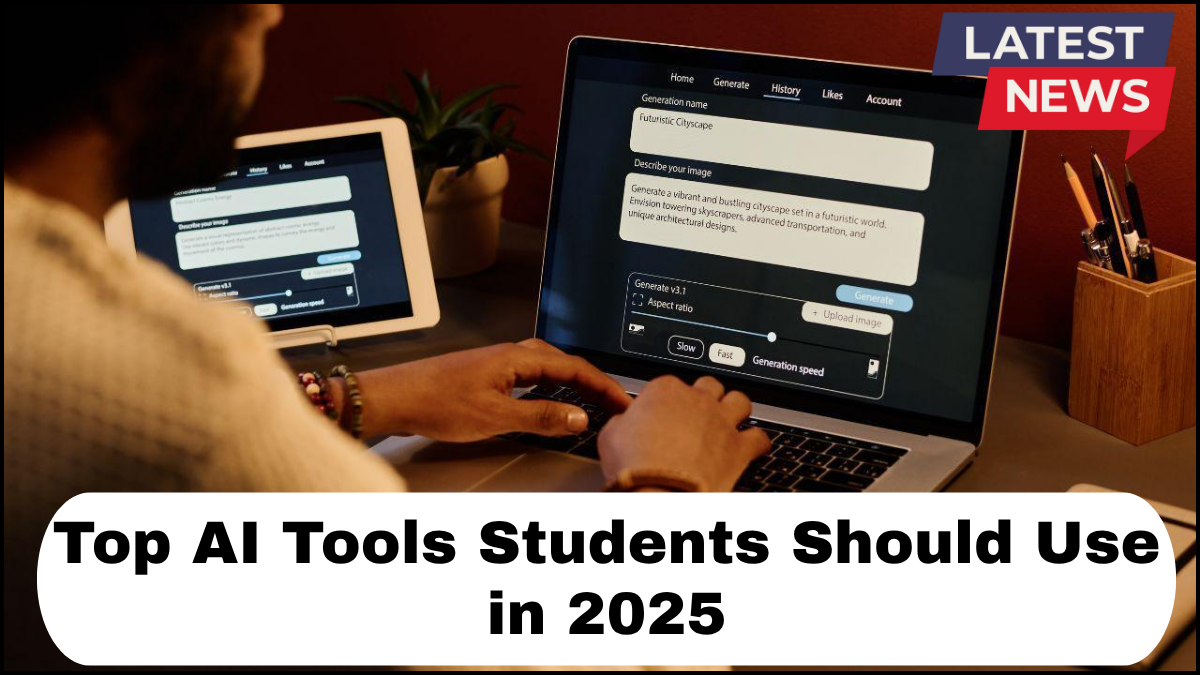As education continues to evolve, AI tools have become essential for students aiming to study smarter, not harder. In 2025, the landscape of learning is more dynamic and technology-driven than ever. From automating note-taking to generating personalized study plans, AI tools are reshaping the academic experience. Here’s a look at the top AI tools for students in 2025—and how they can supercharge your study routine with smart, effective study hacks.

1. Notion AI – The Smart Organizer
Notion AI is more than just a note-taking app. In 2025, it’s become a full-fledged academic assistant. Students use it to generate summaries from long lectures, brainstorm essay topics, and even create revision flashcards. The built-in AI analyzes your notes and suggests relevant resources, helping you retain key concepts without the clutter.
Study Hack: Use Notion AI to create daily learning dashboards with to-dos, summaries, and prompts. It keeps your brain engaged and your tasks in order.
2. GrammarlyGO – Your Writing Companion
GrammarlyGO goes far beyond spell checks. This upgraded version of Grammarly uses generative AI to help students craft arguments, outline research papers, and even rephrase text for clarity. It offers tone adjustments, structure improvements, and real-time feedback tailored to academic writing standards.
Study Hack: Use GrammarlyGO to run multiple versions of your essay drafts and compare tones—professional, persuasive, or analytical—to find the one that fits best.
3. Quizlet AI – Adaptive Learning on Autopilot
In 2025, Quizlet’s AI has become more than a flashcard app. It now generates quizzes from lecture slides, textbooks, and even class recordings. It also adapts based on your performance, ensuring repeated exposure to weak areas.
Study Hack: Upload your notes and let Quizlet AI turn them into a personalized quiz bank. It’s like having a private tutor who knows your strengths and weaknesses.
4. Khanmigo (by Khan Academy) – Personalized Tutoring with GPT Power
Khanmigo, powered by advanced GPT tech, offers real-time tutoring that mimics one-on-one sessions. Students can ask it to explain calculus problems, review history timelines, or solve chemistry equations step by step.
Study Hack: Ask Khanmigo to explain concepts as if you’re five. This helps break down complex ideas into simple terms, making them easier to remember.
5. Elicit – The AI Research Assistant
Doing academic research is often time-consuming. Elicit uses AI to search and summarize peer-reviewed papers, helping students build literature reviews or back up their thesis statements with credible sources.
Study Hack: Use Elicit to find gaps in existing research and form unique arguments. This gives your work originality and depth—critical in academic writing.
6. Otter.ai – AI-Powered Transcription and Summarization
Otter.ai has leveled up in 2025, offering real-time transcription for in-person lectures, Zoom calls, and even audio notes. It not only transcribes but also highlights key points and generates summaries.
Study Hack: Record your study group discussions with Otter and review the summarized notes to catch insights you might’ve missed.
7. Wolfram Alpha – The Math and Science Genius
Wolfram Alpha remains a top AI tool for solving complex equations and visualizing scientific concepts. In 2025, it includes expanded interactivity, offering not just answers but step-by-step solutions and detailed explanations for all STEM subjects.
Study Hack: Don’t just use Wolfram to get the answer—use it to walk through the logic. This builds real understanding, especially in subjects like physics and engineering.
8. ChatGPT (with GPT-4.5 and beyond) – Brainstorming, Planning, and Revision
ChatGPT has cemented its place in the student toolkit. Whether you’re generating a thesis topic, structuring a debate argument, or revising code for a class project, ChatGPT adapts to your academic needs. In 2025, it also integrates with popular learning platforms, making it even more accessible.
Study Hack: Use ChatGPT to simulate oral exams. Feed it prompts and answer out loud to boost retention and confidence.
9. Caktus AI – Tailored Academic Writing
Caktus AI focuses specifically on academic content creation. From literature reviews to code explanations, it’s tailored for higher education. Unlike generic AI tools, Caktus keeps formatting and citation standards in check.
Study Hack: Use it to generate citation-rich outlines. This cuts research time in half and gives you a framework to build on.
10. SciSpace Copilot – AI for Scientific PDFs
Reading academic papers can be overwhelming. SciSpace Copilot reads and explains scientific documents in simple language. It highlights definitions, key findings, and related concepts, saving hours of decoding jargon.
Study Hack: Use it to prep for presentations—summarize complex research and translate findings into digestible slides.
Why AI Tools for Students in 2025 Matter
Modern students juggle more than ever—remote learning, hybrid classes, internships, and side projects. These AI tools reduce the cognitive load by automating repetitive tasks, enhancing comprehension, and personalizing the learning experience. By integrating these tools, students can unlock efficient, high-impact study hacks that align with their learning style.
FAQs
Q1: Are AI tools allowed in schools and universities?
Yes, many institutions now encourage the ethical use of AI tools for studying, research, and writing. Always follow your school’s guidelines and disclose AI-assisted work when required.
Q2: Which AI tool is best for exam prep?
Quizlet AI and Notion AI are excellent for spaced repetition and customized review sessions. Combine them for maximum retention.
Q3: Can AI tools replace traditional studying?
Not completely. They’re best used as supplements—enhancing your methods, not replacing your critical thinking or effort.
Q4: Are these tools free to use?
Most offer free versions with limited features. Premium plans often unlock advanced AI capabilities, but many tools remain highly effective at no cost.
Q5: How do I know which AI tool fits my needs?
Start with your biggest pain point—writing, time management, or comprehension—and choose a tool that addresses it directly. Experiment, evaluate, and mix as needed.
click here to learn more